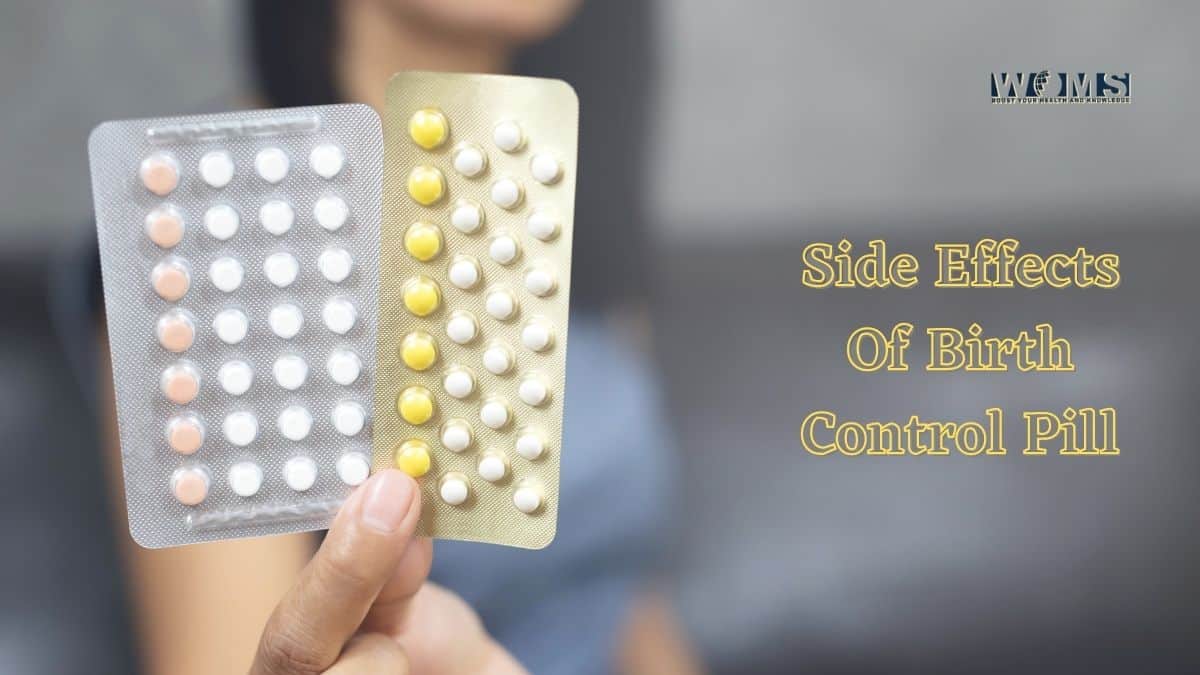Side Effects of Birth Control Pill

Contraceptives with hormones that help stop the ovaries from distributing eggs all through ovulation are known as birth control pills. They also promote cervical mucus thickness, which serves as a deterrent among sperm and any eggs set to release.
General Illustration of Birth Control Pill And Types
When it came to contraceptive pills, there used to be just one choice. It entailed taking an everyday hormone pill for 21 days, accompanied by a 7-day placebo pill (commonly full of sugar). Individuals would’ve had their cycle during the week of contraceptive pills.
Monophasic, biphasic, and triphasic are terms used to describe various kinds of combined birth control pills which comprise estrogen and progestin. A relatively similar quantity of estrogen and progestin is delivered each day by monophasic birth control pills.
During the very initial 21 days of the period, biphasic birth control tablets supply the same quantity of estrogen daily. The progestogen proportion is greater than the previous part of the period to permit the regular loss of the uterine wall.
Across the period, triphasic birth control tablets possess stable or fluctuating estrogen levels and fluctuating progestin levels. There seems to be no indication that biphasic or triphasic contraceptive pills are better or more efficient for preventing unwanted pregnancies than monophasic contraceptive pills, or vice versa.
Almost all estrogen-based birth control methods can increase your chances of some medical conditions. However, Family Planning claims that these dangers aren’t real.
Blockages are one of the more dangerous and significant adverse consequences of birth control pills.
- Gallbladder problems
- Attack on the heart
- Blood pressure that is too high
- A stroke caused by liver cancer
Several more significant health risks are more likely if individuals smoke or are above the age of 35.
Side Effects of Birth Control Pill
Birth control tablets alter a woman’s hormone balance, which can result in a variety of negative consequences. These health risks normally go away after 2–3 months, but they would linger.
In the United States, about 12.6 percent of females between the ages of 15 and 49 use oral contraceptives. The majority of females can safely utilize them. If the adverse effects linger for a lengthy moment or are extremely bothersome, speak with your doctor about switching to a new type or form of birth control.
- Nausea: When taking the pill for the first time, some people suffer slight nausea, although this normally goes away after a few days. It may be beneficial to take the pill with food or at bedtime. People should not be unwell all of the time because of birth control. It’s recommended to see a doctor if the nausea is severe or lasts more than a few months.
- Migraines and headaches: Hormones found in birth control tablets can trigger or exacerbate headaches and migraines. Migraines can be triggered by changes in female sex hormones (estrogen and progesterone)Trusted Source. The dosage and kind of medication can have an impact on the symptoms. Low-dose medications, for example, are less likely to elicit this symptom. If a person’s migraine is caused by PMS, though, taking the tablet may help.
- Mood swings: Hormones have a significant impact on an individual’s feeling states. Variations in hormone concentrations, which might also occur as a result of taking a pill, might impact a person’s state of mind. Recent research, such as a 2016 survey of 1 million Danish women from trusted Sources, indicates that hormonal contraceptives and unhappiness are linked. When an individual is worried about mood swings, they should speak with their doctor. Switching tablets might assist if the problems are connected to taking the pill.
- Reduced sex drive: Many people’s sexual libido, or sex drive, may be affected by the pill. Hormonal shifts are to blame. Others may notice the surge in libido as a result of reducing any fears individuals could have about pregnancy or alleviating PMS symptoms.
- Changes in the eyes: The medication has been connected to the thickness of the cornea of the eyes, according to a Recent Study. This doesn’t indicate an increased danger of eye problems, but it could indicate that your glasses are no longer comfortable. If corrective lens wearers observe any variations in their eyesight or lens tolerability, they should see their ophthalmologist.
- Periods skipped: Using birth control tablets might lead to irregular menstruation or no menstruation at all. This would be due to the hormones found in them. Individuals could use pills to effectively avoid menstruation regardless of the type of birth control they are using. More information can be found here. It is important to undergo a pregnancy test if an individual thinks they are pregnant. The birth control pills are effective, However, pregnancies could happen, mainly when used incorrectly. A delayed or skipped menstruation can be caused by a variety of circumstances, such as travel, hormonal issues, stress, illness, and thyroid issues
- Between-period spotting: Whenever vaginal bleeding develops during a monthly cycle, it is known as breakthrough bleeding or spotting. This could appear as if there is faint bleeding or a brown discharge. Spotting is the greatest frequent complication of birth control tablets, according to Research Published. Since the body adjusts to altering hormone balance and the uterus adjusts to possessing a weaker lining, this occurs. Using the medication is directed, which is typically daily at almost the same moment, may assist individuals to avoid bleeding between menstruation.
Conclusion
Birth control acts by inhibiting the body from forming an egg, leaving sperm with nowhere to go,
Conception is not possible. In addition to irregular, unpleasant, or heavy menstruation, birth control pills can assist with endometriosis, pimples, and premenstrual syndrome (PMS).
Individuals’ negative impacts differ significantly, and various medicines have various adverse consequences. Spotting, vomiting, breast pain, and migraines are all frequent negative impacts.
FAQs
When do the complications of birth control begin?
It’s possible that someone on birth control is to blame. This could give someone’s system 3 to 4 months to acclimatize to the chemicals in a newer birth control pill (or any other form of contraceptive pills such as the patches or injectable), which might lead to pimples or excess weight (though this is usually water retention, not extra fat).
When do you think it’s time to quit taking birth control pills?
Women should cease using the combined pill at the age of 50 and switch to a progestin pill or another form of contraceptives for safety purposes. Also after menopause, it is prudent to use a barrier birth control technique, including condoms, to prevent sexually transmitted infections (STIs).



